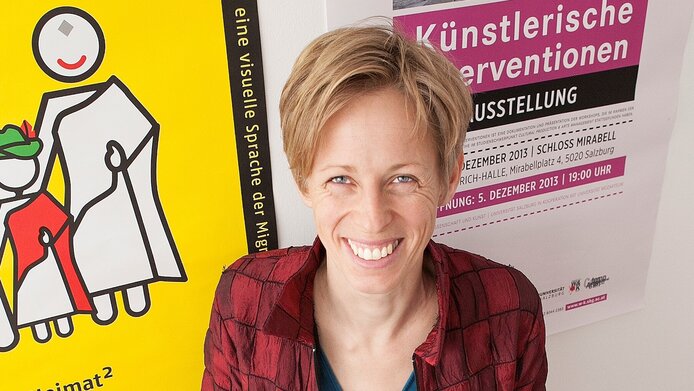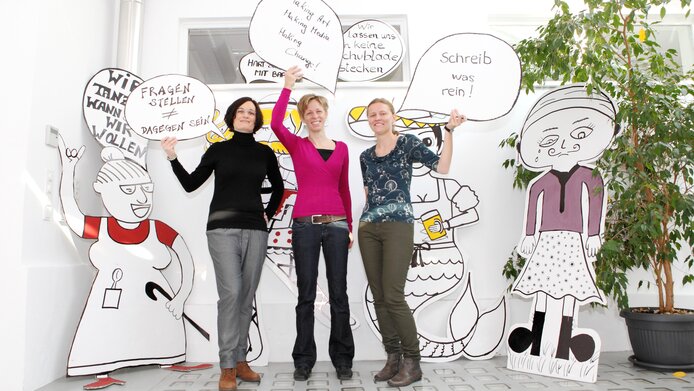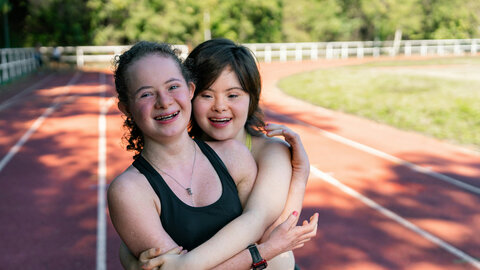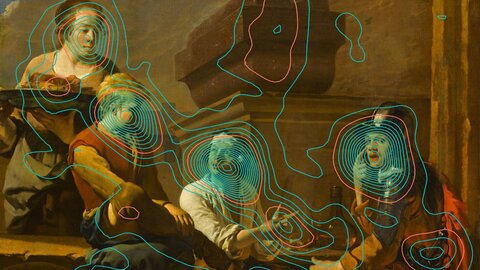Making Art, Making Media, Making Change

“First of all, it's about shaking off your awe of drawing”, Elke Zobl describes the proceedings of her comics workshops. “We start with warm-up exercises, then we try to develop characters that scrutinize stereotypical gender roles like, for example, this ballerina with long, blond hair, a moustache and a drill in her hand. The accompanying bubble says: ‘tough and tender with a ‘stache’.”
Bridging the gap between science and art
Her projects are carried out in public spaces as well at the University of Salzburg. “This combination is very important to us”, Zobl emphasizes. Since 2010 she has been heading the “Contemporary Arts and Cultural Production” program, a cooperation between the University of Salzburg and the Mozarteum University
implemented in 2007. “My job is to accomodate science, teaching and communication. To achieve that, our students are involved in research projects that are simultaneously scientific symposia as well as exhibitions or the like. It`s all intertwined“, the scientist explains. After graduating from high school, Zobl applied for a place in stage design at the Mozarteum University. “I have been interested in art from an early age. Both my parents, who were enthusiastic elementary school teachers, offered me a lot of artists’ materials. And since leisure facilities were rare in our small village in the Pinzgau, I used to work a lot”, the scientist remembers. At the Mozarteum, however, she swapped stage design for sculpture and could not be happier now: “I feel very lucky to be able to accomodate art, science and social change, that is, basically all my interests in my current work.“
Receiving an award for science communication
For her project “Making Art, Making Media, Making Change” Zobl received one of the FWF's first science communication awards. The program, which was first introduced by the FWF in 2013, supports six communication projects by different scientists with a total sum of 263,000 Euros. Its aim is to promote “outstanding scientific communication measures”. The native of Salzburg was one of the six winners. Her workshops are primarily directed at young women between the age of 12 and 26, who are thus given the chance to try their hand as culture and media producers themselves.
Turning consumers into producers
Strictly speaking, Zobl's science communication program consists of two projects sponsored by the Science Fund FWF: the single project “Feminist Media Production in Europe” and the Hertha Firnberg project “Young Women as Creators of New Cultural Spaces”. Overlapping with her interest and involvement in civic participation and feminism, her work is part of a bigger movement towards social, political, ecological and economic justice. Her interviews and analyses as well as further informations and links can be viewed online at www.grassrootsfeminism.net. Basically, Zobl`s research revolves around one central question: How can adolescents, particularly young women, actively improve their own living situations? Her conclusion: By turning from mere media consumers into active producers of mixed media, thereby tackling their own issues as well as actively participating in cultural and political life.
“Grrrl zines”
Both of her research projects, albeit with a different emphasis, deal with “one of the most interesting transformations of youth culture dating from the 1990s ”, as Zobl puts it: A growing number of young people, either independently or in groups, among them especially girls and young women, have started producing media in various formats and on different topics. They have been actively forming networks and creating new working spaces for themselves. In the alternative media world their print magazines are called “grrrl zines”: “Zines” is the abbreviation of “magazines”, the triple “r” indicates their resistance to and their criticism of mainstream culture. The zines, which Zobl has spread on a table in front of her, display a huge variety: Some were made by one person, others by a group of people. But apart from their production processes, they also differ significantly in their topics, professionality and geografic diversity. This enormous range is typical of alternative






